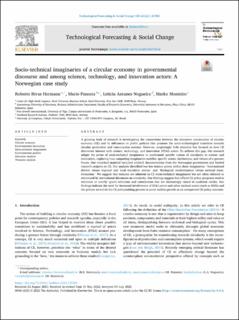Socio-technical imaginaries of a circular economy in governmental discourse and among science, technology, and innovation actors : A Norwegian case study
Peer reviewed, Journal article
Published version
Permanent lenke
https://hdl.handle.net/11250/3013605Utgivelsesdato
2022Metadata
Vis full innførselSamlinger
Originalversjon
Hermann, R. R., Pansera, M., Nogueira, L. A. & Monteiro, M. (2022). Socio-technical imaginaries of a circular economy in governmental discourse and among science, technology, and innovation actors: A Norwegian case study, Technological Forecasting and Social Change, 183: 121903. doi: 10.1016/j.techfore.2022.121903Sammendrag
A growing body of research is investigating the connections between the discursive construction of circular economy (CE) and its influences on public policies that promote the socio-technological transition towards circular production and consumption systems. However, surprisingly little attention has focused on how CE discourses interact with science, technology, and innovation (ST&I) actors. To address this gap, this research adopts the prism of socio-technical imaginaries to understand specific visions of circularity in science and innovation, exploring how competing imaginaries mobilize specific actors, institutions, and visions of a greener future. Our empirical material included archival documentation from the Norwegian government and funded research projects on CE. Our analysis identified two key tension points within these imaginaries: “International drivers versus regional and local transition arenas” and “Ecological modernization versus sectoral transformation.” We suggest that tensions are inherent in CE socio-technical imaginaries but are often silenced or minimized by institutional discourses on circularity. Our findings suggest that official CE policy programs tend to minimize or overtly ignore criticisms and contestation that are increasingly raised in academic circles. Our findings indicate the need for increased involvement of ST&I actors and other societal actors (such as NGOs and the private sector) in the CE policymaking process to avoid endless growth as an unexpected CE policy outcome. Socio-technical imaginaries of a circular economy in governmental discourse and among science, technology, and innovation actors: A Norwegian case study

